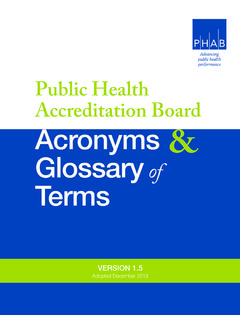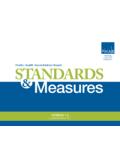Transcription of Quality Improvement Initiatives in Accreditation: …
1 Quality Improvement Initiatives in accreditation : private Sector Examples and Key Lessons for Public Health Prepared for the Robert Wood Johnson Foundation By Michael S. Hamm, CMC Michael Hamm & Associates Submitted to Carol Chang, Program Officer, R&E Director/HSS February 1, 2007 TABLE of CONTENTS Background and Why is QI Important in the private Missions of Accrediting Roles of accreditation as Change Defining Quality through Standards and Contributing to QI by Assisting Applicants Prepare for Summary of accreditation Body Contributions to Potential Lessons for Public Quality Improvement Initiatives in accreditation : private Sector Examples and Key Lessons for Public Health Michael S. Hamm & Associates 3 I. Background and Methodology The Robert Wood Johnson Foundation (RWJF) is conducting a meeting on Adapting Quality Improvement (QI) to Public Health on February 7, 2007.
2 Michael S. Hamm, CMC, a consultant specializing in accreditation and certification program development issues, was chosen to prepare a white paper summarizing Quality Improvement Initiatives utilized in private sector accreditation efforts in light of their potential application in public health. The methodology for preparing this report included conducting research on private sector accreditation programs including Internet searches, telephone interviews with representatives of accrediting bodies and extensive personal experience as a consultant working with accreditation bodies. Information for this report was collected from the following organizations/ accreditation programs: accreditation Organizations American Association of Museums (AAM) American Camping Association (ACA) accreditation Program American National Standards Institute (ANSI) Personnel Certification accreditation Program American Speech Hearing Association (ASHA) accreditation Program Accrediting Council for Continuing Education and Training (ACCET) National Association for the Education of Young Children (NAEYC) accreditation Program Commission for accreditation of Law Enforcement Agencies (CALEA) National Association of Insurance Commissioners (NAIC) accreditation Program National Committee for Quality Assurance (NCQA) Joint Commission (formerly JCAHO) The United States Chamber of Commerce (USCC) accreditation Program Other organizations The Department of Education Underwriters Laboratories, Inc.
3 Malcom Baldrige National Quality Awards Program II. Why is Quality Improvement Important in private Sector accreditation Efforts? accreditation is a conformity assessment process where organizations define standards of acceptable operation/performance and then measure compliance with them. Following accepted Quality Improvement Initiatives in accreditation : private Sector Examples and Key Lessons for Public Health Michael Hamm & Associates 4standards in any activity is one of the benchmarks of Quality and, as such, accreditation bodies usually play a key role in Quality Improvement activities in any industry/sector involved in the process. The pursuit of Quality in the private sector has been described as something close to the quest for the Holy Grail.
4 Almost every industry or service at one time or another considers the development of some performance standards as a process to measure Quality . Applicants for accreditation programs are usually concerned about Quality issues prior to the development of any formal accreditation efforts due to the importance of Quality in meeting customer demands, remaining competitive in their respective fields, and contributing to improved profits. Verification of meeting Quality standards has grown in importance in recent years due to concerns of various users of products and services for some proof of achieving acceptable levels of Quality as determined by peer leadership in a specific service/industry. III. Overview of Quality Improvement Initiatives in private Sector accreditation Programs A.
5 Missions of accreditation Bodies Most accreditation programs are developed by individuals and organizations motivated to define and measure Quality in a particular field. Accordingly, the vision and mission statements of most accreditation bodies include statements regarding defining or improving Quality in their respective field. For example, the mission of the Joint Commission (formerly called the Joint Commission for the accreditation of Health Care Facilities or JCAHO) is: To continuously improve the safety and Quality of care provided to the public through the provision of health care accreditation and related services that support performance Improvement in health care. The National Association for the Education of Young Children (NAEYC) operates a large accreditation program for early childhood education centers.
6 One of their three broad goals is: Supporting early childhood programs by working to achieve a high- Quality system of early childhood education. Including Quality statements in the mission statements of accrediting bodies helps keep these programs constantly focused on Quality Improvement as one of their own measures of success. Quality Improvement Initiatives in accreditation : private Sector Examples and Key Lessons for Public Health Michael Hamm & Associates 5 B. Role as Change Agents and Behavior Modifiers One of the interesting roles that accreditation bodies play in Quality Improvement is that of a change agent. One of the motives for creating new accreditation programs in many fields is to encourage broad institutional change to improve Quality and performance.
7 While this motive often does not get as much public recognition as other goals, its importance should not be overlooked. Building high level commitment to Quality Improvement is essential in all fields. One of the ways that this role is accomplished in accreditation programs is by requiring the signatures of the top staff/volunteer leadership on accreditation applications stating that the organization agrees to follow the accreditation program standards, commit to a program of continual compliance and Quality Improvement , and comply with a required code of conduct/ethics as a condition of achieving accreditation . These commitments clarify the role of accreditation as a long-term Improvement process rather than a single performance evaluation experience.
8 These commitments give staff/volunteer leadership a mechanism to support Quality Improvement efforts and to avoid actions that may jeopardize accreditation status or hinder Quality Improvement efforts. Codes of Ethics/Conduct Mandatory compliance with codes of ethics/conduct is also a common feature of many accreditation bodies. The linkage of these codes with other accreditation standards and requirements is another Quality control feature of accreditation programs. This linkage can be accomplished by a standard such as the American Speech Hearing Association (ASHA) accreditation standard requiring that clinical education procedures ensure the welfare of each client served by students is protected, and that the clinical education is in accord with ASHA s Code of Conduct.
9 Another approach involves requiring that candidates for accreditation develop their own code of ethics. The American Association of Museums (AAM) accreditation Program requires that all candidates for accreditation submit a copy of their formally approved code of ethics that is consistent with the AAM Code of Ethics for Museums. accreditation applicant codes of ethics are required to cover the governing authority, staff, and volunteers. A third approach used by the American Camping Association accreditation program involves holding camp owners, directors and executives of accredited camps to a higher level code of practice than is required for regular membership in the American Camping Association (ACA). The member code of ethics include six (6) requirements, while members of accredited camps agree to meet an additional ten (10) requirements involving more detailed responsibilities.
10 Linkages to codes of ethics/conduct are considered important in accreditation as educational as well as discipline tools. Enforcement of codes of ethics is often grounds for the revocation of Quality Improvement Initiatives in accreditation : private Sector Examples and Key Lessons for Public Health Michael Hamm & Associates 6accreditation or some other disciplinary action. Reward and Incentives for High Performance Accrediting bodies consistently recognize and promote applicants that demonstrate high levels of compliance and Quality performance in their respective fields. This is accomplished by: press releases: providing plaques for display in public areas: listings in accreditation body web sites; and through special awards. The Joint Commission awards high performing health care organizations with the Ernest Codman Award.












